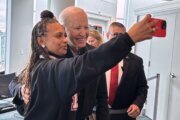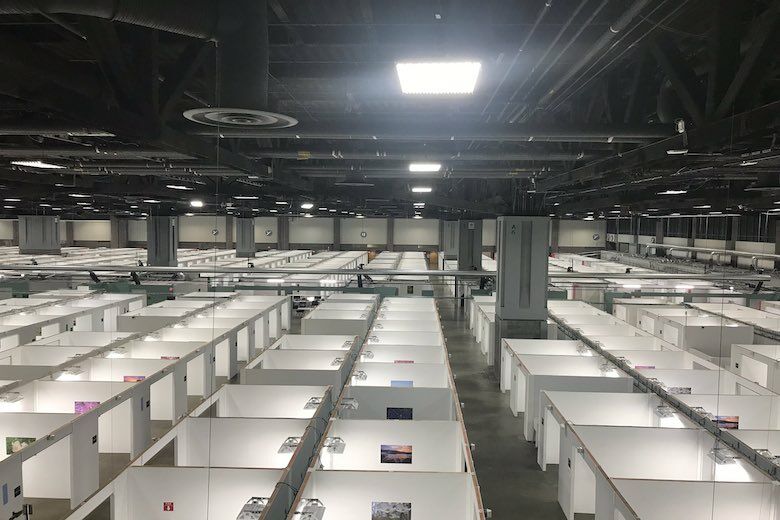
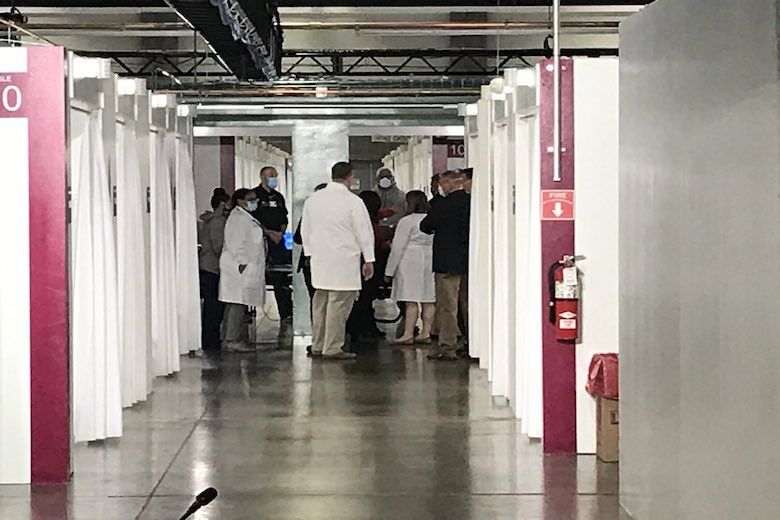
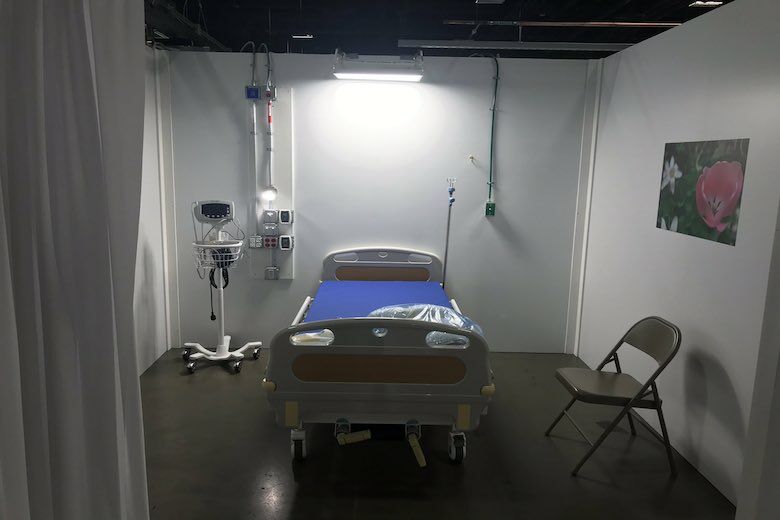
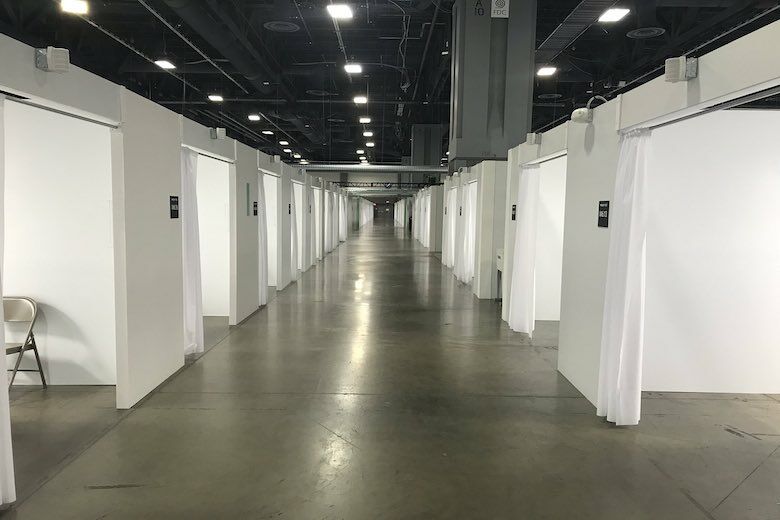
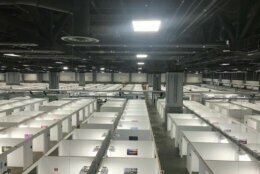
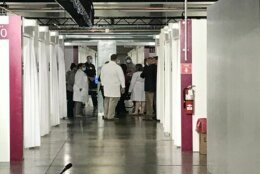
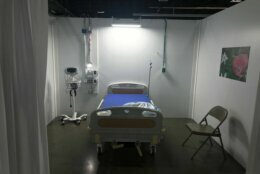
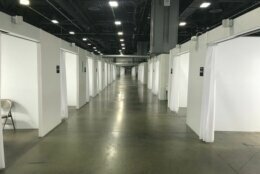
The Washington Convention Center has become an alternate care site, if needed, as part of D.C.’s coronavirus response plan, Mayor Muriel Bowser said during a news conference Monday.
“I’ve said before that we consider this site our insurance policy,” Bowser said. “We hope that we will never have to use it, but it is here and staffed for when we do or if we do.”
The Army Corps of Engineers Lt. Gen. Todd Semonite said it took about 22 days to transform the convention center into an alternate care site. Hall A has been set up to accommodate 437 beds. Starting Tuesday, it will be ready to care for up to 100 patients.
“I can’t think of a more noble calling to be able to build a facility like this to be able to help keep people alive,” Semonite said.
We’ll be live at 11 am to showcase the conversion of the Walter E. Washington Convention Center into an alternate care site to support DC’s coronavirus (COVID-19) response.
1⃣Twitter (@mayorbowser)
2⃣Facebook (https://t.co/Tna0Nh9XIy)
3⃣Channel 16 (https://t.co/44CwI6UlyT) pic.twitter.com/48F6oIog9F— Mayor Muriel Bowser #StayHomeDC (@MayorBowser) May 11, 2020
“The patients who will be coming here will be low acuity COVID-positive patients, meaning these are patients who need neither a ventilator or an ICU bed,” Bowser said.
“However, if a patient is here and their condition worsens, there are six rapid-treatment spaces where patients can be stabilized and returned to an acute care hospital.”
District hospitals are currently at 71% capacity, officials said, not including surge beds.
- Sign up for news alerts from WTOP
- Maryland Del. Cox appears to promote Bill Gates coronavirus conspiracy theory
- Montgomery Co. school system announces graduation changes
- Md. governor asked to document distribution of COVID-19 tests from South Korea
- Washington Nationals’ DJ moves to virtual performances
- Coronavirus test results in DC, Maryland and Virginia
- Coronavirus FAQ: What you need to know
D.C. Department of Public Works Director Chris Geldart explained what it would take to trigger the use of the convention center as a care site for patients.
“The best place for a patient to get seen and get care is inside the four walls of a hospital,” he said. “So, we are going to ensure that we use the maximum we can of hospital space, and then we would look at how we bring patients into here. And that process will go from the individual hospitals first to here.”
“So, we want the hospitals to use their surge capacity because that’s the best place for a patient and, as we get close to that capacity, that’s when we would start to accept patients,” Geldart said.
Uptick in DC coronavirus cases, deaths
D.C. reported an additional 112 coronavirus cases Monday for a total of 6,389.
There were also five more deaths, for a total of 328.
The District has interactive maps of infections throughout the city, by ward and neighborhood, online. Columbia Heights and 16th Street Heights remain the two neighborhoods with the greatest number of infections, with 354 and 327, respectively.
Bowser said her office would announce whether the stay-at-home order for D.C. would be extended sometime this week.
DC doctor anticipates what may come next for city’s fight against virus
Doctor Jack Sava is the medical lead for D.C.’s new alternate site at the Washington Convention Center and is also chief of surgery at MedStar Washington Hospital Center.
Sava said local health officials are waiting to see what may come next in the region’s response to the coronavirus pandemic.
“We in the hospitals feel like we are just waiting to see how everyone outside handles this, because we’re obligated to take everything that comes in, but we really don’t control that”, said Sava.
Sava also told WTOP that local hospitals might be in better shape because the region “had more lead time” compared to hot spots like New York.
“Looking at New York and hoping that we wouldn’t quite find ourselves quite in that position and thankfully, because we’ve [had] a couple weeks more lead time, [hospitals] have a good shot of not being that overwhelmed,” said Sava. “But certainly that’s been on everyone’s mind, and we want to do everything possible to prepare for that.”
Dr. Sava also shared his thoughts about D.C.’s eventual reopening.
“So far, I’ve been actually pretty impressed with the way [D.C. Department of Health Director] Dr. Nesbitt and the Mayor have approached this, and I have a lot of faith that they’ll make the right decision when the time comes,” said Sava.
“The people calling those shots are going to have to keep a close eye on the data and make sure that, as there’s a step-wise opening, that we don’t see a huge peak that requires new steps.”
Antibody testing and remdesivir
D.C. Health and the Department of Forensic Sciences are working with health care providers in the District to conduct a citywide survey to test for antibodies, Bowser said. And health care providers are receiving guidance on who should be considered for antibody testing.
Previously, most of the testing was diagnostic, to determine whether a person has COVID-19.
“The survey will focus on individuals with a high risk of exposure,” Bowser said. “The experts still don’t know whether previous infection causes any sort of immunity. But this testing will be important to helping us determine the extent of infection in our city, the prevalence of asymptomatic infections and insights on how the virus is affecting children.”
D.C. Health Director Dr. LaQuandra Nesbitt also said that the District was set to receive 400 vials of the broad-spectrum antiviral medication remdesivir, which appears to have had some small measure of success against COVID-19 in clinical trials.
“We will receive a supply of that and we’ll make allocation plans to all of our hospitals based on their current treatment of COVID-19 positive patients,” she added.
“We will plan to allow our hospitals to accept the allocation. We are not planning to force the allocation on any particular hospital,” Nesbitt said.






